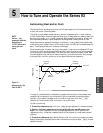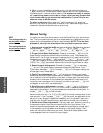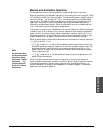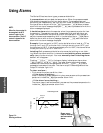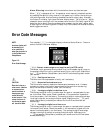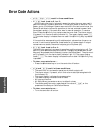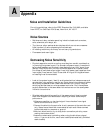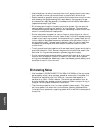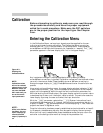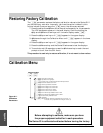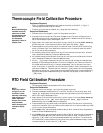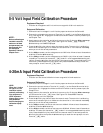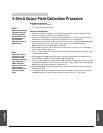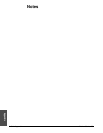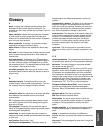
A.2 ■ Appendix Watlow Series 93
Appendix
• Use twisted pair wire any time controller circuit signals must travel more
than two feet, or when you bundle them in parallel with other wires.
• Select the size or gauge of wire by calculating the maximum circuit current
and choosing the gauge meeting that requirement. Using greatly larger
wire sizes than required generally increases the likelihood of electrostatic
(capacitance) coupling of noise.
• Eliminate ground loops in the entire controller system. You can spot the
obvious loops by studying the "as-built" wiring diagram. There are also
not-so-obvious ground loops resulting from connecting internal circuit com-
mons in the manufacturer's equipment.
• Do not daisy chain ac power (or return) lines, or output signal (or return)
lines to multiple controller circuits. Use a direct line from the power source
to each input requiring ac power. Avoid paralleling L1 (power lead) and L2
(return lead) to load power solenoids, contactors, and controller circuits. If
an application uses L1 (power lead) to switch a load, L2 (return lead) has
the same switched signal and could couple unwanted noise into a con-
troller circuit.
• Tie all ground terminals together with one lead (usually green wire) tied to
ground at one point. Don't connect the ground to the controller case if the
controller is in a grounded enclosure (preventing ground loops).
• Do not confuse chassis grounds (safety ground) with controller circuit com-
mons or with ac supply L2 (return or neutral line). Each return system
wiring must be separate. Absolutely never use chassis ground (safety) as a
conductor to return circuit current.
Eliminating Noise
• Use "snubbers" (QUENCHARC™ P/N: 0804-0147-0000) to filter out noise
generated by relays, relay contacts, solenoids, motors, etc. A snubber is a
simple filter device using a 0.1µf, 600 volt, non-polarized capacitor in
series with a 100Ω, 1/2 watt resistor. The device can be used on ac or dc
circuits to effectively dampen noise at its source. Refer to output wiring in
Chapter Two for proper Quencharc installation.
• The ultimate protection is an "uninterruptable" power supply. This "sens-
es" the ac power line; when the line fluctuates, a battery-powered 60Hz
inverted circuit takes over, supplying power within one-half to one cycle of
the ac line.




